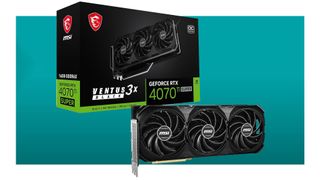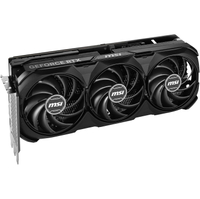This RTX 4070 Ti Super is down to a new low price of $750 for Prime Day as the next-gen looms large
Come on Nvidia and co., you can clear shelves even faster if you drop prices more.

MSI RTX 4070 Ti Super | 16 GB GDDR6X | 8,448 shaders | 2,655 MHz boost | $839.99 $749.99 at Amazon (save $90, exclusive to Prime members)
The RTX 4070 Ti Super might be relatively new to the market, but we're finally seeing discounts on what is a very performant card. This model is very solid and comes with a triple fan cooler, and with the power of DLSS 3 makes for a mighty addition to any gaming rig.
RTX 4070 Ti Super price check: Walmart $799.99 | Best Buy $829.99 | Newegg $769.99
In the market for a new high-end graphics card? You have two choices in front of you: Option 1 is buy a current generation RTX 40-series or RX 7000-series GPU today, perhaps saving yourself a chunk of change with a Prime Day GPU deal; Option 2 is twiddle your thumbs until the next-gen arrives.
If you're going with Option 1, and here to score yourself a top deal on a current-gen card, I've got a great pick for you from the October Prime Day sales.
It's an MSI GeForce RTX 4070 Ti Super 16 GB Ventus 3X on sale for $750, down from $840. That's the lowest price for this card over at Amazon since July, when this listing was created.
The RTX 4070 Ti Super launched as a replacement for the RTX 4070 Ti. The Super model is marginally faster in games, due to the cut-down RTX 4080 GPU housed within it. This offers a marginally higher core count (8,448 to 7,680) and memory capacity (16 GB to 12 GB) versus the non-Super Ti. Altogether, that amounts to a marginally faster card in the Super variant—5%, 10% maybe.
The important factor to consider is that the RTX 4070 Ti Super arrived at the same $799 MSRP as the RTX 4070 Ti. Though third-party cards like this one from MSI were often more expensive. This deal we're looking at today is a rare discount below that original MSRP price.
We reviewed this same MSI RTX 4070 Ti Super model back at launch. The triple-fan design kept relatively cool in our testing with a peak temperature of just 68 °C.
Because we can't simply have nice things, it's worth noting that this specific Ventus 3X model may require a BIOS update to unlock its full potential. When we first tested the Ventus 3X, it had lost around 5% performance to a dodgy BIOS. That's since been patched with subsequent updates, and later versions of the card should come with it pre-installed, but on the off chance you end up with one of the initial production run, you can download the latest BIOS file on the MSI website.
The biggest gaming news, reviews and hardware deals
Keep up to date with the most important stories and the best deals, as picked by the PC Gamer team.
Option 2 requires some patience. That's because we don't actually know when Nvidia intends to release its next GeForce graphics cards. Rumours were flying of a late 2024 release for the two models most likely to launch first, the RTX 5090 and RTX 5080, but it's more likely an early 2025 launch. Perhaps over at the Las Vegas tech extravaganza CES, which will have Jen-Hsun Huang, Nvidia big boss and billionaire, up on stage to give a keynote.
Even then, we wouldn't expect to see a new $750 RTX 50-series card arrive alongside the super-expensive ones, which means potentially an even longer wait.
Looking to AMD doesn't offer much hope, either. Again, we have no idea of exactly when it intends to launch its next-gen GPUs, but it's also unlikely we'll see many uber-high-end cards out of the red team. Instead, it's rumoured to be pulling back with mid-range offerings only.
You could make a good argument for either option, 1 or 2, depending on your circumstances. If you're desperate for an upgrade, a graphics card deal such as this for $750 could plug a PCIe slot for you in your time of need. If you are prepared to fight the bots on launch day, however, you could end up with a significantly faster card than what's available today for similar money—just depends when Nvidia gets around to launching 'em.
Where to find the best graphics card deals

Jacob earned his first byline writing for his own tech blog. From there, he graduated to professionally breaking things as hardware writer at PCGamesN, and would go on to run the team as hardware editor. He joined PC Gamer's top staff as senior hardware editor before becoming managing editor of the hardware team, and you'll now find him reporting on the latest developments in the technology and gaming industries and testing the newest PC components.
Most Popular








